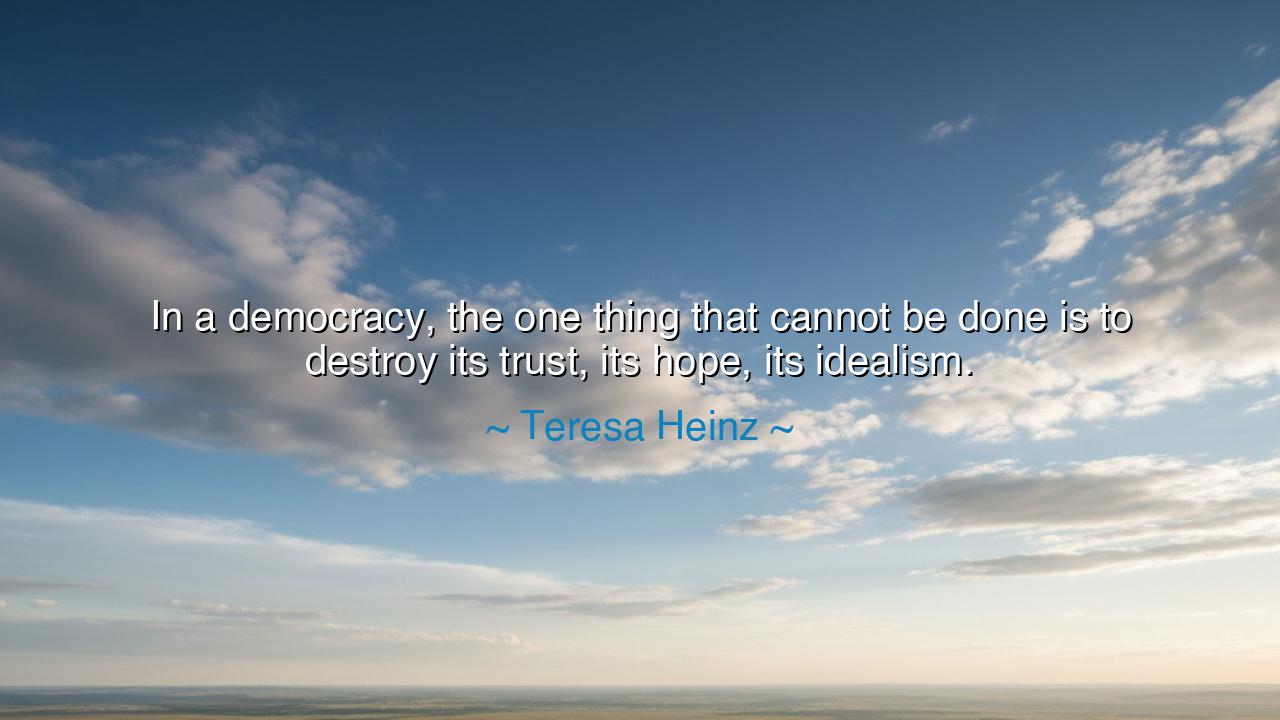
In a democracy, the one thing that cannot be done is to destroy
In a democracy, the one thing that cannot be done is to destroy its trust, its hope, its idealism.






“In a democracy, the one thing that cannot be done is to destroy its trust, its hope, its idealism.” Thus spoke Teresa Heinz, a woman of intellect and conviction, whose words carry the weight of generations who have fought to preserve the fragile light of liberty. Her statement, though modern in tongue, is ancient in spirit—for it reminds us that democracy is not merely a system of government but a living covenant between people and their own better nature. It is built not on swords or walls, but upon trust, hope, and idealism—three pillars that, if broken, cause the entire edifice to crumble into tyranny and despair.
The origin of these words lies in a truth understood by every civilization that has ever risen toward freedom: that no law, no constitution, no election can preserve a democracy if the hearts of its people grow cynical. Trust is the breath of democracy—it is what binds citizen to citizen, leader to people, and present to future. Hope is its light, the promise that tomorrow can be made better through the labors of today. And idealism, that sacred fire of the soul, is its enduring strength—the belief that justice and compassion are not dreams but duties. When these three forces die, democracy dies before a single shot is fired.
In the story of Athens, the first great democracy, we find both the glory and the warning. The Athenians, once united in purpose, allowed suspicion and pride to poison their trust. Leaders pursued ambition rather than virtue, citizens turned against one another, and the very ideals that had built their freedom became hollow words. The trial and death of Socrates, condemned by his own democracy, stand as a haunting symbol of what happens when hope and idealism are betrayed. Athens fell not because of external invasion, but because its spirit corroded from within. Teresa Heinz’s words echo that same timeless warning: that democracy dies not by the sword, but by the loss of faith in its soul.
Yet there are also tales of renewal—moments when trust and hope were restored by courage. Consider the story of Abraham Lincoln in the midst of America’s Civil War. The nation was divided, its democracy bleeding from within, its ideals mocked by the brutality of brother against brother. Lincoln understood that the survival of democracy depended not only on victory in battle but on the preservation of its moral vision—the belief that liberty belonged to all. His words at Gettysburg were not a declaration of conquest, but a prayer for renewal: that “government of the people, by the people, for the people, shall not perish from the earth.” In that moment, he rekindled the dying flame of trust and hope, reminding his people that democracy, though wounded, could be reborn through unity and compassion.
For this is the heart of Heinz’s message: that democracy is an act of faith, renewed daily by those who choose honesty over cynicism, community over division, and compassion over apathy. When citizens lose faith in one another, when truth becomes negotiable, when leaders exploit fear instead of nurturing hope—the democratic spirit begins to rot. And once lost, it is not easily restored. A nation without trust becomes a wilderness of suspicion; a nation without hope becomes enslaved by despair; and a nation without idealism becomes a husk, ruled by selfishness and greed.
Yet, she also reminds us that these things—trust, hope, and idealism—are not gifts bestowed by governments, but virtues cultivated by individuals. The responsibility of democracy rests upon every soul who participates in it. To build trust, one must act truthfully and honor promises. To sustain hope, one must look beyond despair and believe in the possibility of renewal. To preserve idealism, one must refuse to surrender to apathy and cynicism, even when the world grows dark. Each citizen becomes a guardian of the democratic flame, and when all hold that flame together, no storm can extinguish it.
The ancients would have called this a sacred duty—a civic virtue, born of love for one’s fellow man and reverence for justice. For democracy, though imperfect, is the highest expression of humanity’s belief in its own worth. It is a living testament to the idea that ordinary people, guided by conscience and compassion, can govern themselves in freedom. When Teresa Heinz warns that democracy cannot survive without its trust, hope, and idealism, she is not speaking of politics alone—she is speaking of the human spirit itself.
So, my friends, let her words be carved upon your hearts. Guard the trust between you and your neighbor; nurture the hope that tomorrow can be brighter; protect the idealism that makes you believe in justice, equality, and truth. Do not mock the dreamers who speak of a better world—for they are the lifeblood of every democracy. Live honorably, speak truthfully, and act with compassion, for in these simple deeds lies the strength of nations. Remember always: tyrants may command armies, but the people command destiny—so long as they do not lose faith in one another.
Thus, as Teresa Heinz reminds us, democracy’s greatest enemy is not tyranny, but despair. Let us therefore live as its guardians, kindling again and again the sacred flame of trust, hope, and idealism, so that it may never go dark, and the voice of freedom may echo across the ages.






AAdministratorAdministrator
Welcome, honored guests. Please leave a comment, we will respond soon